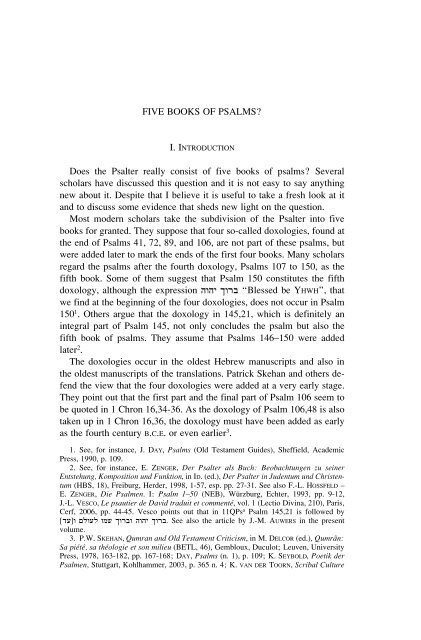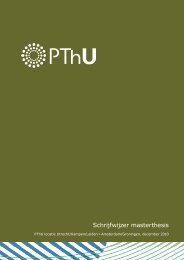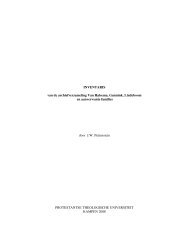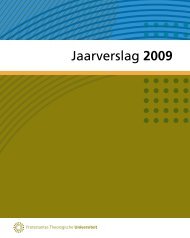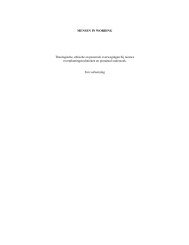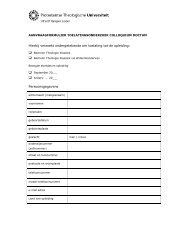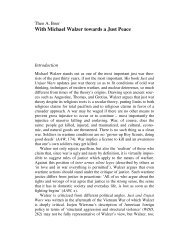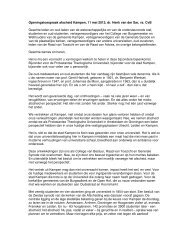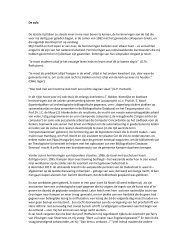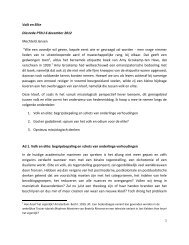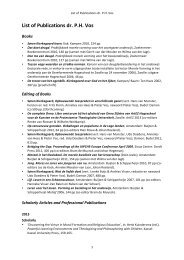the composition of the book of psalms - Protestantse Theologische ...
the composition of the book of psalms - Protestantse Theologische ...
the composition of the book of psalms - Protestantse Theologische ...
Create successful ePaper yourself
Turn your PDF publications into a flip-book with our unique Google optimized e-Paper software.
FIVE BOOKS OF PSALMS? 677FIVE BOOKS OF PSALMS?I. INTRODUCTIONDoes <strong>the</strong> Psalter really consist <strong>of</strong> five <strong>book</strong>s <strong>of</strong> <strong>psalms</strong>? Severalscholars have discussed this question and it is not easy to say anythingnew about it. Despite that I believe it is useful to take a fresh look at itand to discuss some evidence that sheds new light on <strong>the</strong> question.Most modern scholars take <strong>the</strong> subdivision <strong>of</strong> <strong>the</strong> Psalter into five<strong>book</strong>s for granted. They suppose that four so-called doxologies, found at<strong>the</strong> end <strong>of</strong> Psalms 41, 72, 89, and 106, are not part <strong>of</strong> <strong>the</strong>se <strong>psalms</strong>, butwere added later to mark <strong>the</strong> ends <strong>of</strong> <strong>the</strong> first four <strong>book</strong>s. Many scholarsregard <strong>the</strong> <strong>psalms</strong> after <strong>the</strong> fourth doxology, Psalms 107 to 150, as <strong>the</strong>fifth <strong>book</strong>. Some <strong>of</strong> <strong>the</strong>m suggest that Psalm 150 constitutes <strong>the</strong> fifthdoxology, although <strong>the</strong> expression ברוך יהוה “Blessed be YHWH”, thatwe find at <strong>the</strong> beginning <strong>of</strong> <strong>the</strong> four doxologies, does not occur in Psalm150 1 . O<strong>the</strong>rs argue that <strong>the</strong> doxology in 145,21, which is definitely anintegral part <strong>of</strong> Psalm 145, not only concludes <strong>the</strong> psalm but also <strong>the</strong>fifth <strong>book</strong> <strong>of</strong> <strong>psalms</strong>. They assume that Psalms 146–150 were addedlater 2 .The doxologies occur in <strong>the</strong> oldest Hebrew manuscripts and also in<strong>the</strong> oldest manuscripts <strong>of</strong> <strong>the</strong> translations. Patrick Skehan and o<strong>the</strong>rs defend<strong>the</strong> view that <strong>the</strong> four doxologies were added at a very early stage.They point out that <strong>the</strong> first part and <strong>the</strong> final part <strong>of</strong> Psalm 106 seem tobe quoted in 1 Chron 16,34-36. As <strong>the</strong> doxology <strong>of</strong> Psalm 106,48 is alsotaken up in 1 Chron 16,36, <strong>the</strong> doxology must have been added as earlyas <strong>the</strong> fourth century B.C.E. or even earlier 3 .1. See, for instance, J. DAY, Psalms (Old Testament Guides), Sheffield, AcademicPress, 1990, p. 109.2. See, for instance, E. ZENGER, Der Psalter als Buch: Beobachtungen zu seinerEntstehung, Komposition und Funktion, in ID. (ed.), Der Psalter in Judentum und Christentum(HBS, 18), Freiburg, Herder, 1998, 1-57, esp. pp. 27-31. See also F.-L. HOSSFELD –E. ZENGER, Die Psalmen. I: Psalm 1–50 (NEB), Würzburg, Echter, 1993, pp. 9-12,J.-L. VESCO, Le psautier de David traduit et commenté, vol. 1 (Lectio Divina, 210), Paris,Cerf, 2006, pp. 44-45. Vesco points out that in 11QPs a Psalm 145,21 is followed bySee also <strong>the</strong> article by J.-M. AUWERS in <strong>the</strong> present .ברוך יהוה וברוך שמו לעולם ו[עד]volume.3. P.W. SKEHAN, Qumran and Old Testament Criticism, in M. DELCOR (ed.), Qumrân:Sa piété, sa théologie et son milieu (BETL, 46), Gembloux, Duculot; Leuven, UniversityPress, 1978, 163-182, pp. 167-168; DAY, Psalms (n. 1), p. 109; K. SEYBOLD, Poetik derPsalmen, Stuttgart, Kohlhammer, 2003, p. 365 n. 4; K. VAN DER TOORN, Scribal Culture


